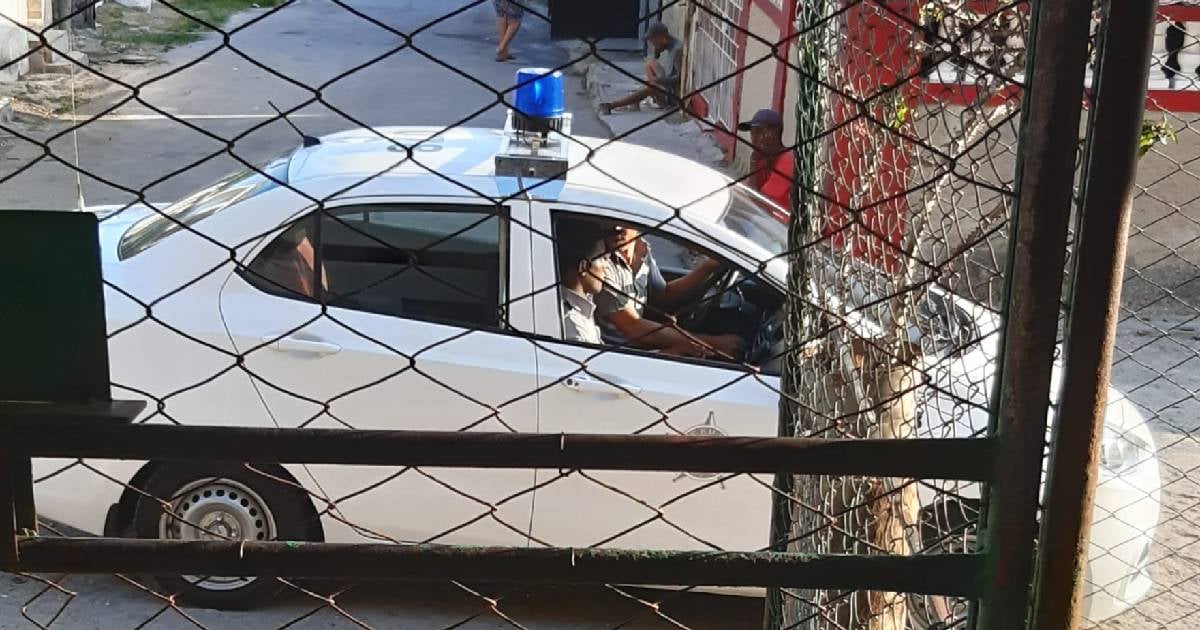The Cuban government mobilized this Saturday against Cuban activists to prevent public demonstrations on the eve of the anniversary of the death of Cuba's National Hero, José Martí, amidst growing public discontent over prolonged power outages on the island. Activists Wilber Aguilar Bravo and intellectuals Jorge Fernández Era and Miryorly García have reported surveillance around their homes.
"Yesterday they said no one is repressed for thinking differently, and today I wake up like this. I am an ordinary Cuban with thousands of problems, and you continue your harassment against me and my family. In a country where there are no blind people but many mute ones. Freedom for my son Walnier and all political prisoners. Without freedom of expression, without freedom of movement, without freedom of assembly, without freedom of any kind. FREEDOM," denounced Aguilar Bravo in a Facebook post. He also shared images showing several police cars outside his home.
Likewise, Fernández Era stated that since the morning, a police patrol car with two uniformed officers has been stationed outside his house, and when he went out to throw away the trash, they escorted him to the car and asked for his ID card. "They are so dishonest that they won't admit that the purpose of this deployment is me. They just say, with absolute cynicism, 'we are just doing our job,'" he expressed.
The editor and researcher Miryorly García, for her part, said she was given "an illegal order prohibiting me from leaving my house, an illegal and temporary house arrest. The only explanation I can see is because today is the 18th, and if I decide to stand in a park with a flower for José Martí on the eve of the anniversary of his death or with a sign that says the beautiful word FREEDOM, so revolutionary that word itself, the Revolution collapses," she stated.
Researcher Alina Bárbara López and Jenny Pantoja Torres, on the other hand, managed to reach the Liberty Park of Matanzas to place a floral offering at Marti's feet. Bárbara López stated in a post that she would not stop her monthly act of civic protest despite the government's harassment, which on April 18th detained her so violently that doctors had to immobilize her injured hand. At the end of her post, she referred to a recent interview conducted by Franco-Spanish journalist Ignacio Ramonet with Cuban ruler Miguel Díaz-Canel, where he claimed that dissent is not repressed in Cuba.
"On June 18th, I will be at Central Park in Havana. I assure friends and people concerned for my safety that nothing will happen to me. I became convinced of this after reading the interview where the 'intelligent, measured, and sensible' president presented by Ramonet; a man who, according to the interviewer, stands out for his 'well-considered analysis, foresight, and sound advice'; well, that paragon of virtues vigorously denounced police brutality in the United States with these words: 'We have seen scenes of a teacher, already an elderly person, subdued, humiliated on the ground. That does not happen in Cuba, that does not happen in Cuba!'
Since that perfectly describes what happened to me on April 18th at the Bacunayagua police checkpoint, I must believe that President Díaz-Canel gave explicit orders to State Security not to bother me. It is that, or the 'independent republic of Bacunayagua' is no longer part of Cuba," she affirmed.
There are also reports that the government has summoned protesters from recent demonstrations in Baracoa and militarized streets in Santiago de Cuba, amid the popular dissatisfaction due to the energy crisis that leaves Cubans experiencing blackouts of up to 20 hours daily.
Key Questions on Activist Harassment and Protests in Cuba
Given the recent developments in Cuba regarding police harassment of activists and mobilization to prevent protests, here are some critical questions and answers that provide more insight into the situation.
Why are Cuban activists being harassed by the police?
Cuban activists are being harassed by the police to prevent them from organizing public demonstrations and expressing dissent, especially around significant dates like the anniversary of José Martí's death.
What is the significance of José Martí in Cuba?
José Martí is considered Cuba's National Hero. His death anniversary is a significant date for Cubans, often used as a moment to express national sentiment and dissent.
How is the energy crisis affecting the protests in Cuba?
The energy crisis in Cuba, leading to blackouts of up to 20 hours daily, has increased public dissatisfaction and driven people to protest against the government's inability to provide basic services.
What are the government's claims regarding repression in Cuba?
The Cuban government, as stated by Miguel Díaz-Canel in a recent interview, claims that there is no repression against dissent in Cuba. This is contradicted by activists' reports of police harassment and surveillance.
